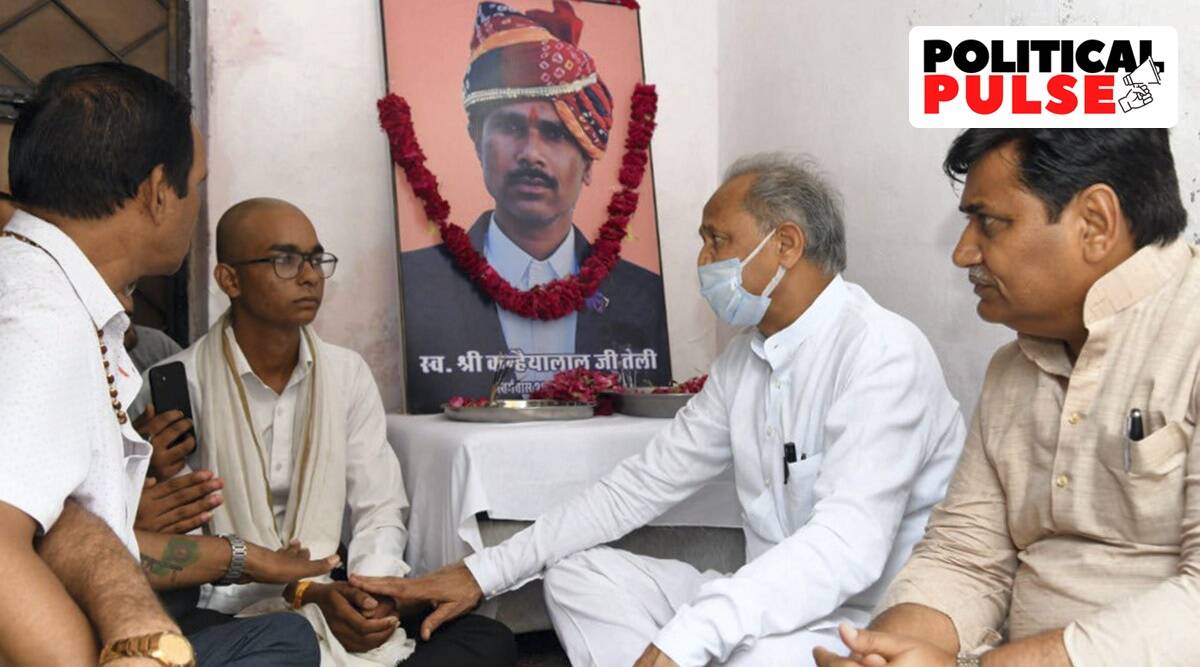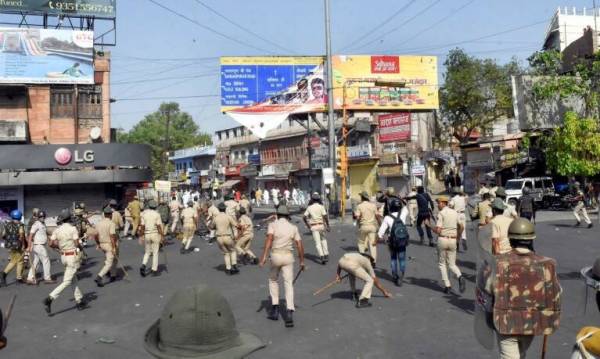
Rajasthan has been on edge since the gruesome killing of an Udaipur tailor Kanhaiya Lal by two men, Mohammad Riyaz and Ghouse Mohammad, on June 28 for allegedly sharing remarks made by the BJP’s Nupur Sharma against the Prophet, with protests erupting in different parts of the state, forcing the Congress government led by Chief Minister Ashok Gehlot to rush to deal with the situation.
The Gehlot government immediately went into overdrive in a bid to contain the incident’s fallout, putting Rajasthan on high alert, imposing prohibitory orders under CrPC section 144 across the state for a month, and suspending mobile internet across the state including Jaipur. On Thursday, Gehlot made an appeal to the people of the state, through front-page advertisements in dailies as well as digitally, calling upon them to maintain peace and harmony.
With a string of incidents of communal violence occurring in various districts over the last several months, leading to a sharp spurt in polarisation, Gehlot seems to be struggling to come to grips with its political ramifications, even as the next Assembly election is one-year-five months away.
On April 2, communal clashes erupted in Karauli following alleged stone-pelting at a motorcycle rally passing through a Muslim-dominated area on Hindu New Year day.
On May 2, a day ahead of Eid, curfew was imposed and Internet services barred in Jodhpur, Gehlot’s home turf, after communal clashes broke out following the hoisting of religious flags on the bust of a freedom fighter.

 Police resort to baton charge after clashes broke out between two communities on Eid-ul-Fitr, in Jalori Gate area, Jodhpur. (PTI)
Police resort to baton charge after clashes broke out between two communities on Eid-ul-Fitr, in Jalori Gate area, Jodhpur. (PTI)
Three days later, communal tension gripped Bhilwara, which led to the suspension of the internet services. On May 10 again, Bhilwara again saw a communal flare-up that was followed by another such incident in Hanumangarh the day after.
To tackle the spate of communal incidents, the Rajasthan Police undertook a 15-day drive in May, cracking down on over 4,600 people in this regard.
Subsequently, Rajasthan did not report any violence on June 10 on the occasion of Ram Navami, when communal incidents were reported from Gujarat, Madhya Pradesh, Jharkhand, West Bengal and Karnataka, among other states. This was ensured by the Gehlot administration by imposing prohibitory orders under CrPC section 144 in over half of the state’s 33 districts, and coming up with an exhaustive order before granting permission to any procession for the day.
Later, the Rajasthan Police took various other measures. For instance, it asked every police station in Jaipur North to create 24 cricket teams involving local residents for a tournament called “Hero Cup” from June 21 to July 3 with the objective to build and promote communal harmony in the belt.
And then the Kanhaiya Lal killing occurred that led to a fresh war of words between the Congress and the principal Opposition BJP, with the latter accusing the ruling party of indulging in “appeasement politics”. What is more concerning for the Congress is the point that any rise in polarisation would only be an advantage for the saffron party since it would mean the consolidation of the Hindu votes in the latter’s favour.
Over the decades, the BJP and the Congress have tried to woo the dominant castes in Rajasthan, which include Jats, Rajputs, Gujjars, Meenas and Brahmins, and their support to either party has been dependent on various factors, such as the prevailing political climate, reservation demands, community leaders, party leaders from the community, and even portrayal of the erstwhile rulers from the community in the movies, etc.
And traditional caste rivalry between Rajputs and Jats as well as between Meenas and Gujjars is well known in the state. So between Rajputs and Jats, if a caste supports a particular political party, then the other caste supports its rival party.
In fact, the Shri Rajput Karni Sena (SRKS) was founded following the Rajputs’ struggle with the Jats in 2006. That year, Anandpal Singh, a Ravana Rajput and then Rajasthan’s most notorious gangster, killed Jivan Ram Godara and Harphool Ram Jat in Didwana, allegedly over control of the illicit liquor business. As Jats protested, they got support from a wide spectrum of political leaders, and the police allegedly detained any Rajput man who could be linked to Anandpal. To resist their alleged “hounding”, the SRKS was founded on September 23, 2006, with 11 declared aims, including opposing political or social malice against Rajputs as well as the “misrepresentation” of their history or historical figures, and promoting Rajput unity.

 Police at the scene of crime after the murder of a tailor by two men, allegedly over his social media posts, in Udaipur. (PTI)
Police at the scene of crime after the murder of a tailor by two men, allegedly over his social media posts, in Udaipur. (PTI)
Political analyst Ashfaque Kayamkhani says that with increased polarisation, the distances between Hindu castes may fade and be replaced with the politics of majority versus minority with the latter as the “common enemy”.
He says that the polarisation “will indeed lead to a loss for the Congress” and that “the manner in which it is painted as the party of one community, it will lead to anger in both communities towards Congress” as the party tries to do a tightrope walk and falter. And as elections draw closer, the environment will be further vitiated and polarised, which will help parties which play the communal card, he says.
Sociologist Rajeev Gupta says that it is still too early to say how the polarisation will play out in the Rajasthan Assembly elections in late 2023, but “definitely the BJP will take advantage of the situation”.
He says that the Congress’ internal fighting doesn’t help things either with even its leaders like Acharya Pramod Krishnam jumping into the Gehlot vs Sachin Pilot debate. “This is what democracy within the Congress is, but the party in power at the Centre says that the Congress is having internal fighting so even if they win, they will not be able to deliver,” Gupta said.
Just a day ago, Union minister Anurag Thakur slammed the Gehlot government over the Udaipur case, charging that the state government remained a “mute spectator” as the Congress’ internal rivalries affected law and order in the state. In contrast, Gupta adds, there may be factionalism within the state BJP “but every faction talks about Hinduism”.
https://images.indianexpress.com/2022/06/Udaipur-6.jpg
Source